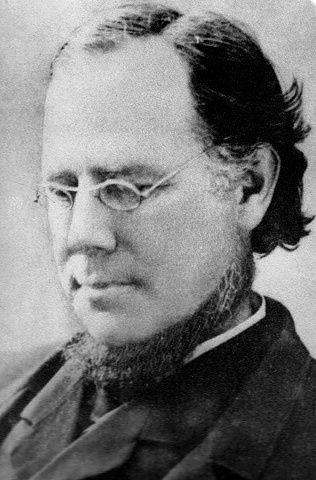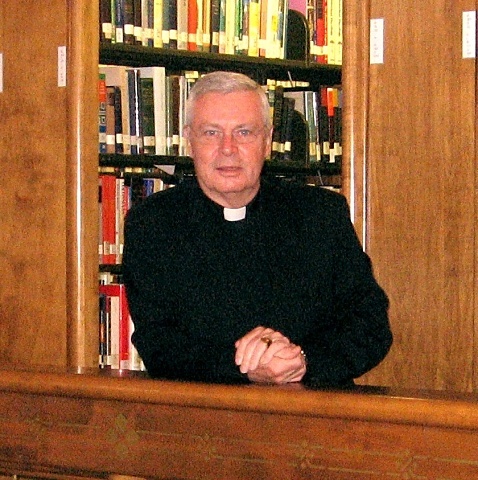November 5, 2012
This is the twenty-ninth in a series of previously unpublished reflections from the 1854 spiritual notebook of Paulist Founder, Servant of God Father Isaac T. Hecker. The reflection series is being made pubic in conjunction with Father Hecker’s cause for canonization. Father Paul Robichaud, CSP, Paulist historian and postulator for Father Hecker’s cause for sainthood, offers a response to Father Hecker’s reflection.

Love is only perfect when the lover is lost irremediably in the beloved, “I am my beloved’s and my beloved is mine.” (Song of Songs 6:3). There is a science of love as well as a love of science. There are souls also which God has given a special attraction for the former as well as the latter. God appears sometimes to certain souls so beautiful that they can acquire nothing but the science of loving.
“Love” says St. Thomas (Aquinas) “is a certain affection by which the lover is transformed into the object loved.” Where two creatures in the same order of creation love each other, there will be a mutual transformation. If the object loved is equal in all respects to the capacity of the lover then a perfect love would give the lover, or if they are both equal to each other, would give the lovers both repose. But man having something divine in his nature, therefore nothing created can give perfect repose but God.
Divine love first enters our souls as a thief; then becomes a tyrant; and finally bestows upon us as a superabundant benefactor a thousand-fold more than we ever hand before with life eternal – a spouse. St. Augustine (of Hippo) said, “Lord give me your love and do with me as You please.” May we not say as well, “Lord, keep us from offending you, and then do what You please with Your servants.”
John Tauler beautifully says that divine love is a fire, which consumes all terrestrial things and produces in man a happy desolation. “Love consists in loving God without consolations” Tauler says, “One must overcome all to gain all; to gain that precious stone which is God.”

When we hear the phrase, “the science of love” we may think in modern terms of the biological aspects of human attraction or the psychology of love. Servant of God Isaac Hecker, St. Therese of Lisieux (1873-1897) and other spiritual writers in the 19th century used the term to refer to an organized body of knowledge about love. This was not an abstract philosophy or theology of love, but knowledge that comes from the experience of loving. How rigorously scientific it was – is not the point. For these writers love is experiential. Because God is experienced through love and because the more you love, the more you come into union with God. Love attracts more love and human love can lead to divine love. Father Hecker uses the example of “beautiful souls” who by the pure nature of their love attract God’s very presence.
Father Hecker writes on love in the thought of St. Thomas Aquinas, St. Augustine and Master John Tauler. Aquinas starts with the natural order of creation. Drawn to each other two creatures are transformed by the love of each other. They find mutual repose or happiness in the other. But Aquinas reminds us that humankind is made in the divine image of God, and because there is something divine in human nature, perfect happiness can only be found in God’s love. Augustine tells us of the primacy of love. God’s love cannot only bring us perfect happiness but is more than enough for us. The Dominican John Tauler* speaks of God’s love as a consuming fire which burns away all earthly consolations and leaves us only with God. In summary love draws us towards the other and transforms us. Human love flows into God’s love for God is love. Human nature does not rest until it rests in God’s love; and as we grow in divine love we are united to God. Divine love burns away all earthly consolations as we deepen our unity with God leaving us in love with God alone.
*John Tauler (1300-1361), the German Dominican mystic and preacher and student of Master Eckhart was a spiritual favorite of Father Hecker’s who in turn introduced Tauler to his Paulist disciple Walter Elliott, who translated his sermons into English. The center of Tauler’s mysticism is the blessed contemplation of God, which he takes from Aquinas. Tauler teaches that ever deepening knowledge of God is attainable in this world and should be sought by every means. God dwells within each human being. In order, for the transcendent God to appear in man, the human, sinful activities must cease. Aid is given in this effort by the light of grace, which raises nature far above itself. The way to God is through the primacy of love.
About Father Isaac Hecker’s 1854 Spiritual Notebook:
Servant of God, Father Isaac Hecker wrote these spiritual notes as a young Redemptorist priest about 1854 and they have never been published. Hecker was 34 years old at the time, and had been ordained a priest for five years. He loved his work as a Catholic evangelist. The Redemptorist mission band had expanded out of the New York state area to the south and west, and the band’s national reputation grew. Hecker had begun to focus his attention on Protestants who came out to hear them. To this purpose Hecker began to write in 1854 his invitation to Protestant America to consider the Catholic Church, “Questions of the Soul” which would make him a national figure in the American church.
Hecker collected and organized these notes that include writings and stories from St. Alphonsus Liguori, the Jesuit spiritual writer Louis Lallemant and his disciple Jean Surin, the German mystic John Tauler, St. Thomas Aquinas and St. Jane de Chantal among others. These notes were a resource for retreat work and spiritual direction and show Hecker’s growing proficiency in traditional Catholic spirituality some ten years after his conversion to the Catholic faith. They are composed of short thematic reflections.